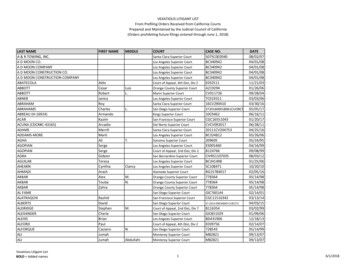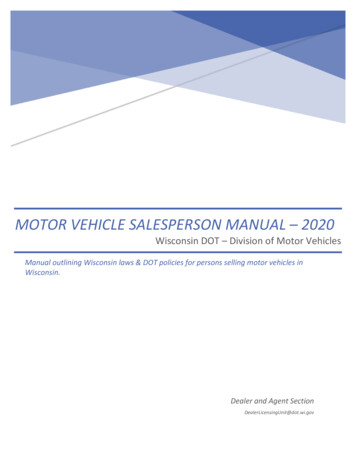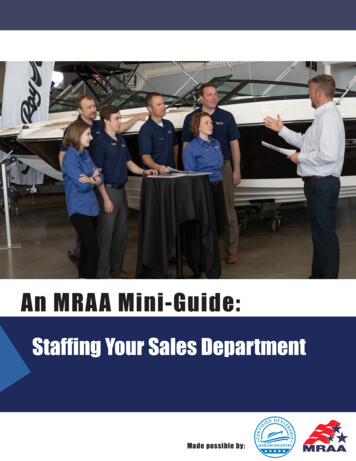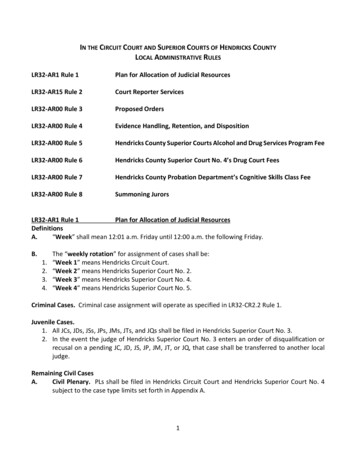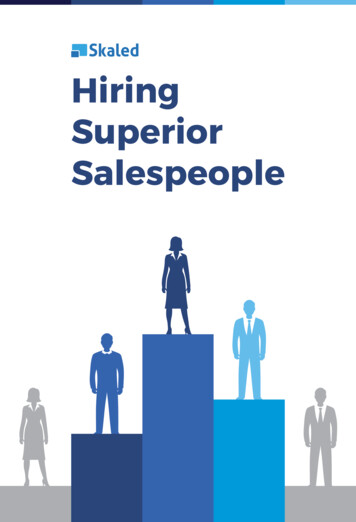
Transcription
HiringSuperiorSalespeople
ContentsChapter 1:Our Sales World Is Changing51.1 The Evolution of Salespeople61.2 Specialization of the SalesOrganization91.3 The Rungs of DNA BehindSuperior Salespeople13Chapter 2:Ready, Set, Hire!172.1 13 Interview Questions ThatReveal True Sales Talent182.2 Don’t Onboard More, OnboardBetter23Appendix:Survey Questions and ResultsHiring Superior Salespeople282
IntroductionHiring Superior Salespeople is a quick-start guide for hiringmanagers, sales leaders, management teams, andCEOs. You’ll find that our experience, research, and ideaswill help you to find, interview, hire, and onboard superiorsalespeople.Why create this eBook?It’s simple. We created this book to help executivesand sales leaders find talent that moves their companyfinancially and strategically forward. Hiring sales and salesleadership roles can be very daunting and our goal isto distill everything we have learned and our data fromsurveying 100 CEOs and founders so you can avoid thehiring pitfalls and mistakes that we all make.We surveyed 100 executives and founders to understandhow they go through the sales hiring process. This bookhelps identify sales talent needs and provides insight intohow to fell those needs with quality people.Hiring Superior Salespeople3
What You’ll Take AwayThis eBook provides a good starting point for: Understanding the differences between salespeople fromyears past and today. Identifying the various roles that make up the moderncorporate sales machine. Discovering the many personality traits that are essential forsales success. Asking the right questions and properly exposing superiorsales talent. Planning the right way to train, onboard, and consistentlychallenge your salespeople. Promoting the right people to manage your sales team andto lead by example.Hiring Superior Salespeople4
Chapter 1:Our Sales World IsChanging1.1 The Evolution of Salespeople1.2 Specialization of the SalesOrganization1.3 The Rungs of DNA Behind SuperiorSalespeopleHiring Superior Salespeople5
1.1 The Evolution ofSalespeopleThe modern salesperson has changed drastically —from Aaron Ross’ revolutionizing prospecting for SaaScompanies by establishing the modern SDR role, to thegrowth of customer success roles, to enhancing postsale relationships, sales is a process that requires lesssalesmanship and more skills that build on customerexperience. The next generation of sales professionals willneed to develop a success roadmap that they can optimizefor both sellers and buyers.There are three major differences between successfulsalespeople from previous generations and those today:1. Today’s salespeople use tech everydayThe meaning of a great salesperson has shifted. We knowturnover is high and ramp-up time is already seven to 12months. High-growth teams are successful only when theyhire agile, digital and tech-savvy people.Ramp-up time is already seven to12 monthsThe B2B sales landscape constantly evolves, requiringteams to quickly adopt new technologies that streamlineclearly-defined sales processes. The newest high performerwill be the one who has a more operational approachand who can efficiently incorporate new technologies intotheir processes.Hiring Superior Salespeople6
2. Today’s salespeople are constantlyadapting to modern buyers’ needs.The general framework for a modern B2B sales process isoutlined in CEB’s The Challenger Sale. In it, Matthew Dixonexplains, “a Challenger is really defined by the ability todo three things: teach, tailor, and take control.” He alsoclearly distinguishes the Challenger salesperson fromthe relationship builder; while the Challenger is “focusedon pushing the customer out of their comfort zone, theRelationship Builder is focused on being accepted into it.”A Challenger is really definedby the ability to do three things:teach, tailor, and take control.But today’s sales professionals are more than justChallengers. They understand the consumer buyingprocess and then adapt their sales strategyaccordingly. To do this effectively, salespeople take thepros of both Challenger and effective project managementto drive the deal forward.They are not only Challengers, but they also understandthat they must show ROI to both decision makers and endusers. We call this the Parallel Path sales process becausethere are many stakeholders in even the most basic sale.We run multiple simultaneous sales processes with eachclient. The modern sales pro must be able to hold manytypes of conversations.Hiring Superior Salespeople7
3. Today’s salespeople enhancebuyers’ existing information onthe product and industry throughthought leadership.Whether it’s G2crowd or other software review platform,the availability of product information grows daily. Salesprofessionals who continue to “product dump” areineffective, whereas those who provide real industry insightsand thought leadership are more important than ever.Inbound leads come prepared with product knowledgeand a deeper understanding of the market, and outboundleads have the benefit of both good and bad client feedbackof your services even before answering your call.Given the amount of information available to buyers,salespeople aren’t just selling products—they’rereframing the world of their prospects. By collaboratingwith marketing teams, Salespeople are now empoweredwith valuable industry insights and thought leadership. Theycan intelligently lead prospects to the conclusion that theirproduct is the only solution.Hiring Superior Salespeople8
1.2 Specialization of the SalesOrganizationWith the evolution of sales have come specialized rolesto tackle new challenges. Whether it’s the huge influenceof technology or the increased length of buyer cycles, youneed more than just a great salesperson. Here’s what thenew sales organization looks like:Outsourced HelpFinding help from external sources, such as virtualassistants to help build your sales outreach list, savesmoney and keeps your business development repsfocused more on sales strategy and less on administrativeresponsibilities.Sales EnablementSalespeople require endless information to pitch and closeclients successfully. The sales enablement coordinator/manager works with the marketing team to developdigestible and visually appealing collateral for both salesand clients.Sales OperationsThe sales operations associate/manager is a highlyanalytical, process oriented individual who provides anessential, albeit often misunderstood, role. Ask any salesleader whom they wish they had hired sooner, and the salesHiring Superior Salespeople9
operations person will often be their answer. Why? Theyliaise with the company’s teams, forecast milestones, andfacilitate and analyze the metrics to get there.Sales Development Representative(SDR) aka BDR (Business DevelopmentRep) or aka MRR (Market Response Rep)for inbound leadsAlong with outsourced help, SDRs build sales lists, calland email leads, and use prospecting tools as the firstsales touch point. This allows them to be on-boardedimmediately. Grit and hustle are still required qualities, andSDRs also need to be adept at using quantitative sales tools.Their success is measured by sales qualified leads whichcan be meetings they set or qualification calls they make.They should, however, also work on and complete smalldeals to build up their confidence and get them ready tobecome full-on account executives.Account ExecutiveThese are the people doing most of the deal-making andclosing. After SDRs coordinate appointments, the accountexecutive’s job is to demo the product/service, identify painpoints and service gaps through a holistic discovery process,and navigate the prospect down the funnel.Hiring Superior Salespeople10
Usually, account executives are hired once there’s a healthyfunnel in place and they have enough work to rationalizetheir paycheck. These roles are typically 50% base and 50%variable pay based on bookings or ACV.Account ManagerThis is the post-sale, client-facing role that’s focused onretention and upselling throughout the client’s tenure. 73%of those surveyed believe that either client sales growth orretention is the primary responsibility for this role. Mostenterprise sales organizations have account managers tomaintain and build stronger client relationships to achievethese responsibilities. Compensation is typically based onretention and growth depending on core responsibility.Variable comp is usually not as high of a percentage as theaccount executive but should still play a large factor.Customer SuccessA more technical version of the account manager, customersuccess reps sometimes work alongside the sales teamduring pre-sale to ensure a smooth onboarding process forclients. Post-sale, they typically work in tandem with accountmanagers with the goal of gaining customer advocacyat the end-user level and to identify upsell/expansionopportunities. This role may be compensated similarly toan AM or on usage metrics and adoption. Ideally, this rolefocuses on making people love the product, so incentivesshould align to drive that behavior.Sales Onboarding/TrainingNot always a role needed at a startup, but the salesonboarding specialist is a necessary addition when yoursales team is growing rapidly and you’ve discovered asuccessful sales process.Hiring Superior Salespeople11
Remember, an untrained employee can cost you as muchfinancial loss as a bad employee. Instead of firing/hiring newsalespeople, increased productivity and profit is the ROIof hiring a sales onboarding trainer to work with fresh andeven experienced talent.To clarify, these roles are not fads or trends; this is thefuture of the modern sales organization. Just as we’veseen many traditional marketing roles become obsoleteor passed over by younger, more tech-savvy talent, salesleaders without operational and tech-forward minds willface the same inevitable fate. Remember, the key is toget to solid revenue generation, not to go from 0 to 100employees the fastest! Devise a plan for utilizing rolespecialization to increase your organizational efficiency.Hiring Superior Salespeople12
1.3 The Rungs of DNA BehindSuperior SalespeopleYou’ve now learned how salespeople have evolvedwith specialized roles and responsibilities, the adventof technology, and unbounded access to consumerinformation. But what makes some of them superior toothers? We’ve identified certain traits that are consistentwith successful salespeople. I have hired hundreds ofsalespeople and still get it wrong at times. These qualitiesmay be slightly different for your organization as certainskills may be more or less important based on your salescycle and type.“ Great salespeople are unafraid, hard working,and won’t take no for an answer. The bestsalespeople are incredibly curious andinquisitive, likable, and have an energy tothem; they will earn your trust and you’ll doanything they say.”Abby Schneiderman,Co-Founder of EverplansAt one of my stops as a VP of Sales, we used assessmenttesting, Profiles XT, which helped confirm much of theinsights below. They may sound cliché, but the results theybring are anything but. Keep your eye out for the following:Hiring Superior Salespeople13
1. CoachabilityEasily one of the most important qualities of any superiorsalesperson, coachability is having an open mind and asponge-like learning ability. Again, sales constantly changes.Without coachability, though, a salesperson cannot adaptto those changes. Coachability doesn’t just mean takingadvice from a mentor or manager, but actually learningfrom all aspects of the business including industry trends,competitors’ strategies, and even prospects and customers.2. CuriosityIf the Challenger sales style is the most successful, thencuriosity is its secret weapon. The average salespersonis okay with trying to make things work with presentinformation, but with curiosity, an above averagesalesperson asks probing questions to better identifywhether the prospect is a good fit or not.3. Competitiveness, not aggressionSales, by nature, is competition. Externally, it’s a strategicgame in which a salesperson uses their skills to promotea product or service to prospects who are often wellinformed and likely being sold to by competitors. Internally,a competitive spirit plays a big part in reaching On-TargetEarnings (OTE) and in leading a team by example. After all,nobody wants to be last place on the leaderboard. Likemost things, this is a trait that’s great in the right dose,but too little or even too much can negatively impacta rep’s performance and fit. What’s noteworthy is thatcompetitiveness surfaces differently in different people.Look for both the quiet and vocal competitor.Hiring Superior Salespeople14
4. Empathy, or at least the ability tofake itSales has the reputation of being a cutthroat career,but more often than not, successful salespeople useempathy to get ahead. You want someone who caresfor your customers by providing them with value ratherthan someone who’s only interested in the size of theircommission check. In fact, 35% of those surveyed believethat relating to a client or communicating relevant value tothem is the most important sales skill.“ Do they understand others’ thoughts, beliefs,and feelings, then act accordingly? Sales isall about understanding the customer andbuilding relationships.”Brandon Redlinger,Director of Growth at Engagio5. Time ManagementThe best salespeople use time to their benefit. Theydecide quickly, qualify or disqualify leads fast, and look forways to work more efficiently rather than just to work more.Every salesperson has a potential revenue value per hour,so when they spend time on things that only minimallyimpact selling, they leave money on the table. Greatsalespeople know and use this to drive their daily schedule.6. Problem Solving/IntelligenceSales is a tough job filled with highs and lows. And whilework ethic is really important, a great salesperson bringsa problem-solving mindset to every customer interaction.Intelligence is very important to take a prospect’s “NO”,Hiring Superior Salespeople15
reshape it into a need, and ultimately make it a hard “YES”or, at the least, a conversation piece. This quality is inherentrather than something learned, which makes it harder tospot.All of these are sought-after traits of any job, but especiallyso in sales given the role’s impact on the bottom line,especially in startups or small businesses. Having a surplusof some traits can make up for a lack of others withinlower-level roles, but it’s imperative that senior salesleaders encompass all of them. Indeed, finding effectivesales leaders is one of the most difficult tasks uppermanagement face.What skill has proven most importantto your sales hiring success?4035 (35.0%)302027 (27.0%)21 (21.0%)15 (15.0%)102 (2.0%)0Energy / passionIndustry knowledgeAbility to relate / communicate relevant valueProblem solvingOtherHiring Superior Salespeople16
Chapter 2:Ready, Set, Hire!2.1 13 Interview Questions That RevealTrue Sales Talent2.2 Don’t Onboard More, OnboardBetterHiring Superior Salespeople17
2.1 13 Interview QuestionsThat Reveal True SalesTalentThe most superior salespeople don’t necessarily comefrom sales backgrounds. True sales talent reveals itself indifferent forms, backgrounds, and experience levels. 89% ofthose surveyed said they have hired non-salespeople whobecame successful in traditional sales roles. While roles likeengineering, retail, and marketing were more common thanothers, the overall variety of backgrounds hired for sales isvast!So how do you reveal sales talent when it comes fromso many different places? Describing the qualities of asuperior salesperson is easy, but actually identifying them inpotential hires is another ball game entirely.Have you had experience hiring non-salespeople into sales roles with success?10089 (89.0%)8060402011 (11.0%)0YesNoHiring Superior Salespeople18
At Skaled, we use a combination of probing questionsand the Who method of interviewing to obtain completepersonality, skills, and experience. Use these 13 questionsduring your next round of interviews to identify whichpotential hires have the right skills and attitude.1. How do you remain knowledgeable ontrends considering your target industryor audience?This question identifies how a potential hire performsthe due diligence necessary to move sales conversationsforward. Regardless of the interviewee’s background, ifand how they choose to learn more about their targetcustomers can be applied across industries.2. Can you explain our company to me?Salespeople often take complex ideas and present them insimple, easily digestible morsels. This question showcaseshow much research they’ve done and how adept they are atpitching ideas clearly.3. Is meeting quota every time moreimportant than ensuring yourcustomers are happy?While a “yes” or a “no” could be correct, potential hires whocan show empathy with a hunger to win business will dobetter in modern sales roles where customer success is key.4. When do you decide a prospect isn’t theright fit?Research shows that successful conversion requires sixto eight attempts, but for salespeople time is money. Thisquestion identifies whether a potential hire has the quickdecision-making and time-management skills of an effectivecloser.Hiring Superior Salespeople19
5. What’s your motivation to work in sales?It’s a pretty self-explanatory question, but sales requires alot of motivation. If the potential hire has trouble coming upwith a strong answer, they may not be ready for the role.6. How do you handle objection?Sales success requires persistence and overcomingobjections. How an interviewee answers this questionshows if they can handle the pushback and objectionsprospects inevitably use.7. If a deal is lost, do you ever ask theprospect why? If so, what did they say?Failure comes with the territory, but it’s not necessarily abad thing. Successful salespeople use every lost deal asan opportunity to learn how to improve their strategy forthe future. This question will determine how resourceful apotential hire can be – even with a loss.8. What are some of your go-to questionsto ask prospects?Great salespeople no longer do most of the talking. Instead,they ask relevant questions and actively listen. Potentialhires who can’t ask the right questions ultimately fail toconnect with prospects.9. What are your thoughts on collaborationwithin the sales team as well as withother teams?Sales isn’t a one-person show. A potential hire who doesn’tbelieve in collaborating with other sales colleagues focusmore on their personal success rather than that of the teamand company. And if they don’t see the need to collaboratewith other teams (i.e. marketing), then they are out of touchwith modern sales practices.Hiring Superior Salespeople20
10. Why did you leave your last job?Flat out, this is a very probing question, and the answershould leave you with a better understanding of what theapplicant finds important, how your company aligns withtheir ambition, and any red flags (i.e. laid off vs. fired forunscrupulous behavior).11. What accomplishments are you mostproud of at your last role?Similar to question 10, the answer here not only shows whatthe applicant finds important, but also their effectivenesspreviously. An answer of “never failing to hit quota” is fine,but an applicant who talks about processes they put inplace that positively affected the entire sales team or, betteryet, company, makes a better, more successful sales leader!12. When I talk to your boss at XYZ, how willthey rate your performance on a scalefrom one to 10 and why? How do youspell their name?This is straight from the book Who and has been a gamechanger for us and our clients. The verbiage is critical: saying“when I talk to your boss” instead of “what would your bosssay” changes their honesty. Asking them to spell the namelets them know that you actually do plan on contacting theirboss so the answers are much more authentic than thetypical fluff.Hiring Superior Salespeople21
13. Do you have any questions for me?Good interview questions are meant to elicit deep insightsabout a potential hire but it shouldn’t be a one-way street.It’s important to keep in mind that strong prospective saleshires should have an array of questions they’ve preparedfor you. What questions interviewees ask can not onlydetermine how much research they’ve done, but alsoprovide a glimpse into their discovery process. If you see aclear strategy to their questions–them genuinely wantingto learn more about the role, sales structure, company,competitors, and compensation, then it’s a good indicationof how effective their discovery process will be on the job.Hiring Superior Salespeople22
2.2 Don’t Onboard More,Onboard BetterFinally, you’ve hired your salespeople and sales leader. Whatnext? The answer is simple: onboarding. Why? Split nearlyevenly, 41% of those surveyed said that new sales hiresrequire one to two months to ramp up and on-board, while44% believe it takes closer to three or four months. Andwith 40% of all new employees leaving within their first sixmonths, what happens in those first one to four months iscrucial. An important aspect of hiring superior salespeopleis to ensure they stay long enough to make a difference. Todo this, you must implement a solid onboarding strategy.How long does it take your sales repsto ramp?504041 (41.0%)44 (44.0%)3020108 (8.0%)7 (7.0%)01-2 Months3-4 Months5-6 MonthsMore than 6 MonthsHiring Superior Salespeople23
Build a resource base andconsistently maintain it.Building out a resource repository leads to a morestreamlined learning process. This library can have contentranging from sales scripts, pitch decks, and recordings ofsuccessful deals, to company information and sales techhelp documents.A very important step companies often forget whenonboarding sales hires is getting them acclimated to clients.A large portion of this resource base should focus on thecompany’s customers, what they do, what industries they’rein, and the trends that affect them. HubSpot’s CRO, MarkRoberge, ensures that all his new sales hires get classroomstyle training on their customers.“ They experience the actual pains andsuccesses of our primary customers:professional marketers who need to generateleads online. As a result, our salespeople areable to connect on a far deeper level with ourprospects and leads.”Mark Roberge,Professor at Harvard Business Schooland former CRO at HubSpotNew hires are responsible for consuming and projectingthis large amount of information. Having it easily availableallows them to focus on learning instead of losing valuabletime trying to find what they need. Make this resourcelibrary open-sourced so new hires can also add their ownknowledge. It will not only provide unique perspectives butalso bolster collaboration.Hiring Superior Salespeople24
After, role play with a purposeRoleplaying for sales onboarding purposes has beenaround forever, but as industries, customers, and theirneeds change, so too does the need for relevant training.Roleplaying is a very time-consuming activity, so make sureit’s impactful.Start by creating “subjects” or takeaways for every role-playsession. This segments the learning process into easier-tohandle bites rather than an overwhelming experience. Makesure you’re using real-life situations relevant to each specificsales role. Not only should you provide feedback, but alsoask the sales trainee for their feedback on both themselvesand the roleplaying process itself. Continue these stepsuntil each subject is consumed to a high standard, and don’tforget to keep a lookout for their coachability throughout!Finally, create a mentorshipprogramBeing a self-starter is a great trait to have for a salesperson,but that takes up a lot of time and guesswork. By providinga mentor to new sales hires, you pass on core companyvalues and strategies more effectively.Giving new hires a mentor whom they can shadow for acouple of months creates a one-to-one learning relationshipin which questions are readily answered. More importantly,it provides a setting where performance, job adjustment,and professional growth are discussed without theHiring Superior Salespeople25
pressures found in new-hire reviews. It takes an average ofeight to 12 months for new hires to acclimate to their roleand perform up to par.It takes an average of eightto 12 months for new hiresto acclimate to their role andperform up to par.With a thorough onboarding process, that time canbe cut down by 34%—almost a difference of fourmonths! Onboarding provides greater hiring retention,more satisfied managers, and happier, more engagedsalespeople.Hiring Superior Salespeople26
What’s next?We would love to believe that this book answers everysales hiring question, however, we’re huge proponents ofconstantly learning and continually providing insights. Withfresh articles, interviews with some of the best minds insales strategy, and case studies of rapid-growth companies,our weekly newsletter is a great nothing-but-sales additionto your inbox. Once you sign up, you’ll also receive adiscount code to join our new Virtual Sales Academy, alearning platform developed in partnership with SalesHacker to provide sales training at your fingertips.By now, you’ve read 3700 words, but did we misssomething? Do you have sales hiring tips that have helpedyou land awesome talent? Are you ready to implementsome of these learnings for your sales team today? I’d loveto hear from you at jake@skaled.com.Follow UsHiring Superior Salespeople27
Appendix:Survey Questions andResultsHiring Superior Salespeople28
How many people work for yourcompany, in all locations?4033 (33.0%)302012 (12.0%)1014 (14.0%)18 (18.0%)18 (18.0%)5 (41.0%)0Less than 1010 - 4950 - 99100 - 249250 - 499500 or moreHow big is your sales team?403034 (34.0%)24 (24.0%)2022 (22.0%)20 (20.0%)100Less than 1010 - 2526 - 100More than 6 MonthsHiring Superior Salespeople29
What skill has proven most importantto your sales hiring success?4035 (35.0%)302027 (27.0%)21 (21.0%)15 (15.0%)102 (2.0%)0Energy / passionIndustry knowledgeAbility to relate / communicate relevant valueProblem solvingOtherHave you had experience hiring nonsales people into sales roles withsuccess?10089 (89.0%)8060402011 (11.0%)0YesNoHiring Superior Salespeople30
How long does it take your sales repsto ramp?504044 (44.0%)41 (41.0%)30208 (8.0%)107 (7.0%)01 - 2 Months3 - 4 Months5 - 6 MonthsMore than 6 MonthsWhen hiring for Account Managers,your main goal for that function is:5043 (43.0%)4030 (30.0%)3019 (19.0%)20107 (7.0%)1 (1.0%)0Account growthClient retainmentWe don’t have an AM teamCustomer serviceOtherHiring Superior Salespeople31
What are the signs you need to scaleup your sales team? Select all thatapply.504041 (7.0%)42 (19.0%)25 (25.0%)3024 (24.0%)20104 (4.0%)0Current team exceeds all sales goals, no matter how highTerritories are too big to coverNeed to launch into a new marketAll of the aboveOtherHiring Superior Salespeople32
outlined in CEB's The Challenger Sale. In it, Matthew Dixon explains, "a Challenger is really defined by the ability to do three things: teach, tailor, and take control." He also clearly distinguishes the Challenger salesperson from the relationship builder; while the Challenger is "focused

